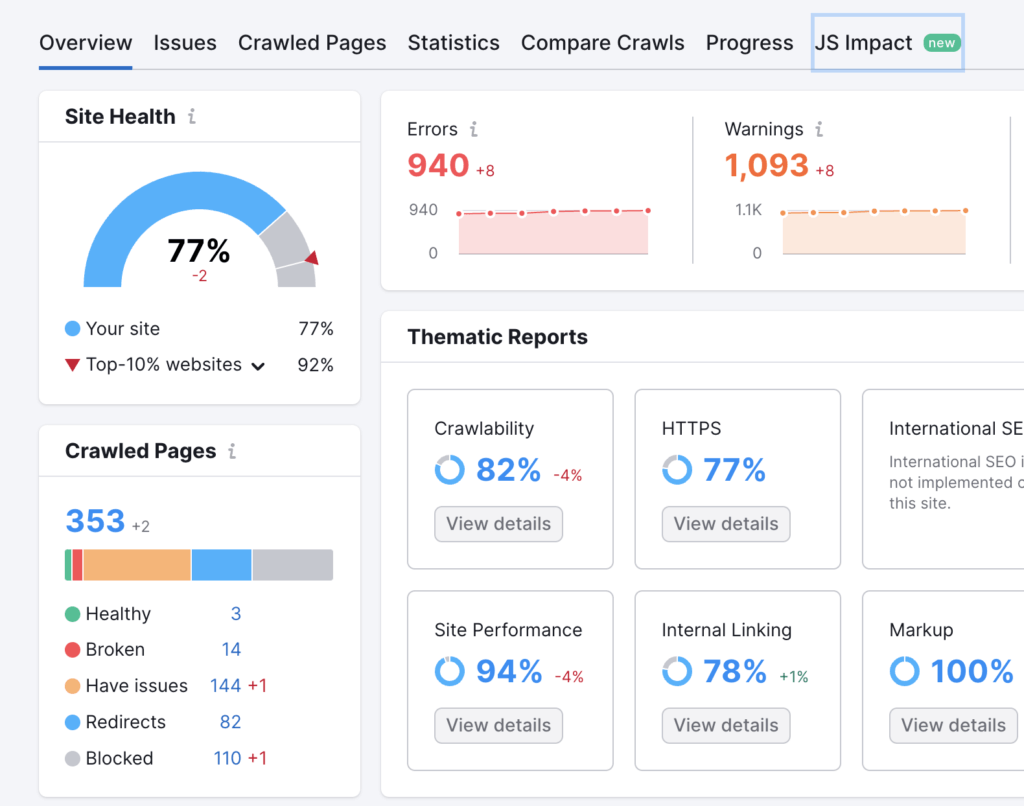Organic traffic is the lifeblood of successful online stores. It refers to visitors who find your website through unpaid search results on platforms like Google. Why is organic traffic crucial? It drives people to your e-commerce store without you having to spend on ads! This makes it a very profitable channel.
It also indicates your SEO health and website visibility. Higher search engine rankings lead to more clicks and increased organic traffic, with valuable users actively seeking products in your niche.
In this article, we explore the world of organic traffic, its game-changing potential for eCommerce, and how to leverage it to enhance your online store’s visibility, customer base, and revenue.
Benefits of Organic Traffic for Ecommerce
Organic traffic clearly indicates your SEO health and your website’s visibility. The higher your pages rank in the search engine results pages (SERPs), the more likely users will click on your site, leading to increased organic traffic. These visitors are highly valuable as they’re actively searching for products or information related to your niche, indicating a strong intent to purchase.
Here are a few other reasons why organic traffic is important for ecommerce:
Greater Credibility and Trust
Organic traffic is driven by search engine rankings, which are often perceived as unbiased and trustworthy by users. When your website ranks organically, it signals to potential customers that your store is relevant, reliable, and authoritative within your industry. This credibility instills trust and confidence, making visitors more likely to engage with your brand and make purchases.
Cost-Effective Acquisition
Compared to paid advertising or other marketing efforts, organic traffic provides a cost-effective way to attract visitors to your eCommerce store. While it may require upfront investments in SEO strategies and content creation, the ongoing benefits of organic traffic can result in a higher return on investment (ROI) over time. By focusing on improving your website’s visibility and relevance in search engine results, you can drive targeted traffic without the continuous expense of paid campaigns.
Sustainable and Long-Term Results
Organic traffic offers sustainability and long-term results for your eCommerce business. Once you establish a strong organic presence through effective SEO practices, your website can continue to attract visitors and generate sales without significant ongoing investments. Unlike paid campaigns that stop driving traffic once the budget is depleted, organic traffic has the potential to deliver consistent results over an extended period.
Targeted Audience Engagement
Organic traffic tends to attract visitors who are actively searching for products or information related to your niche. These users are more likely to be interested in what your eCommerce store offers, leading to higher engagement rates, longer session durations, and increased chances of conversions. By optimizing your website for relevant keywords and providing valuable content, you can connect with a highly targeted audience that is genuinely interested in your offerings.
Enhanced Brand Visibility and Awareness
A strong organic presence drives traffic to your eCommerce store and increases brand visibility and awareness. When your website consistently appears in search engine results for relevant queries, it reinforces your brand’s visibility and builds recognition among your target audience. Over time, this heightened brand exposure can translate into increased brand loyalty, word-of-mouth referrals, and a larger customer base.
Strategies to Increase Organic Traffic
Strategies to increase organic traffic are crucial primarily because they’re a cost-effective way to attract a consistent stream of visitors to your website. Rather than investing heavily in paid advertising, focusing on organic traffic growth allows you to build a sustainable audience over time. Additionally, users who find your site through organic search often have higher intent, leading to better engagement and conversion rates.
In essence, these strategies bring more eyes to your eCommerce site and ensure that these are the right eyes—potential customers actively searching for what you offer.
Here is a list of strategies to generate organic traffic:
- On-Page Optimization
- Off-Page Optimization
- Technical SEO
- Content Marketing
- Link Building
Strategies to Increase Organic Traffic: On-Page Optimization

One of the fundamental pillars of increasing organic traffic is on-page optimization. By optimizing your website’s on-page elements, you can enhance its search engine visibility and improve its chances of ranking higher in relevant search results.
Here are some key strategies to consider:
Optimize Website Content
Create high-quality, valuable, and relevant content that aligns with the interests and needs of your target audience. Conduct thorough keyword research using tools such as SEMRush to identify the terms and phrases your audience is searching for and incorporate them naturally into your content. Focus on providing informative and engaging content that attracts search engines and resonates with your visitors.
Fine-Tune Meta Tags:
Pay attention to your meta tags, including title tags and meta descriptions. These elements provide concise summaries of your web pages and influence how they appear in search engine results. Craft compelling and keyword-rich title tags that accurately reflect the content on each page. Write persuasive meta descriptions that entice users to click through to your website. Optimizing meta tags can significantly impact click-through rates and improve your organic visibility.
Create SEO-Friendly URLs
Ensure your URLs are clean, concise, and descriptive. Incorporate relevant keywords and avoid using long, complicated strings of numbers or symbols. A well-optimized URL structure helps search engines understand the content of your pages’ content and improves user experience by providing clear and meaningful URLs that are easy to read and remember.
Improve Website Speed
Page loading speed is crucial to user experience and search engine rankings. Optimize your website’s performance by compressing images, minifying CSS and JavaScript files, and utilizing caching techniques. A faster website improves user satisfaction and contributes to better search engine rankings, as search engines prioritize websites that offer a seamless and efficient browsing experience.

Strategies to Increase Organic Traffic: Off-Page Optimization

While on-page optimization is important, off-page optimization also plays a significant role in boosting organic traffic. Off-page optimization refers to activities that take place outside of your website but have an impact on its visibility and authority. Here are a few strategies to consider:
Build High-Quality Backlinks
Earn links from reputable and authoritative websites in your industry. High-quality backlinks act as votes of confidence for your website’s credibility and can significantly improve your search engine rankings. Focus on natural link-building techniques, such as creating valuable content that others would naturally want to link to or reaching out to relevant influencers and bloggers for collaboration opportunities.
Leverage Social Media:
Use social media platforms to amplify your content, engage with your audience, and drive traffic to your website. Share your blog posts, product updates, and promotions on social media channels to increase visibility and encourage social sharing. Engage with your followers, respond to comments, and participate in relevant industry discussions to build a strong online presence and attract potential customers.
Foster Online Relationships:
Network with influencers, bloggers, and industry leaders in your niche. Building relationships and fostering collaborations can increase your brand’s visibility, gain exposure to new audiences, and potentially earn valuable backlinks and social mentions. ]Engage in guest blogging, participate in expert roundups, or host joint webinars or podcasts to expand your reach and establish your expertise in the industry.
By implementing these on-page and off-page optimization strategies, you can enhance your website’s visibility, attract more organic traffic, and increase your chances of ranking higher in search engine results. ]Remember, the key is to consistently provide high-quality content, optimize your website for relevant keywords, and engage in ethical and effective promotional activities to build your organic traffic over time.
Strategies to Increase Organic Traffic: Technical SEO

In addition to on-page and off-page optimization, another critical aspect of increasing organic traffic is focusing on technical SEO elements. Technical SEO involves optimizing your website’s technical aspects to ensure it is well-structured, easily accessible by search engines, and provides a seamless user experience. Here are some key strategies to consider:
Improve Site Speed
Site speed plays a crucial role in user experience and search engine rankings. Slow-loading websites can lead to higher bounce rates and lower conversions. Optimize your website’s speed by compressing images, minimizing CSS and JavaScript files, leveraging browser caching, and utilizing content delivery networks (CDNs). Regularly monitor and optimize your website’s performance to provide visitors a fast and seamless browsing experience.
Enhance Mobile-Friendliness
With the increasing use of mobile devices for online browsing, having a mobile-friendly website is essential. Ensure your website is responsive and adapts well to different screen sizes and devices. Implement mobile-friendly design practices, such as using responsive web design, optimizing font sizes, and making navigation easy and intuitive on mobile devices. A mobile-friendly website improves user experience and satisfies search engines, as they prioritize mobile-friendly websites in mobile search results.
Ensure Proper Indexing and Crawlability
Make sure search engines can easily crawl and index your website’s pages. Submit an XML sitemap to search engines, which acts as a roadmap for search engine bots to discover and index your web pages. Use robots.txt files to guide search engine bots and specify which pages should be crawled and indexed. Check for any crawl errors or issues using tools like Google Search Console and address them promptly to ensure all your important pages are indexed and accessible to search engines.
Optimize URL Structure and Site Architecture:
Create a clear and logical URL structure that reflects your website’s content hierarchy. Use descriptive and keyword-rich URLs that accurately represent the page’s content. Organize your website’s navigation and internal linking structure to facilitate easy navigation for both users and search engines. A well-organized site architecture helps search engines understand the relevance and relationship between different pages on your website.
Implement Schema Markup
Schema markup is a structured data vocabulary that provides additional context to search engines about your website’s content. By implementing schema markup, you can enhance the visibility of your website in search engine results pages (SERPs) with rich snippets, such as star ratings, product prices, and review counts. This can make your website more enticing and stand out among the competition, increasing the likelihood of attracting clicks from organic search results.
By focusing on technical SEO elements like site speed, mobile-friendliness, and crawlability, you can improve your website’s performance, user experience, and search engine visibility. These optimizations contribute to a positive user experience and provide search engines with the necessary signals to effectively understand and rank your website’s content. Stay up to date with the latest best practices and regularly monitor and optimize your website’s technical aspects to ensure a smooth and successful SEO strategy.
Strategies to Increase Organic Traffic: Content Marketing

Content marketing is a powerful strategy for attracting organic traffic to your ecommerce website. By creating high-quality, valuable, and engaging content, you can capture the attention of your target audience and establish your brand as an authoritative source in your industry. Here are some tips for leveraging content marketing to increase organic traffic:
Understand Your Audience:
Before creating content, it’s crucial to understand your target audience’s needs, preferences, and pain points. Conduct thorough research to identify the topics, questions, and interests that resonate with your audience. By tailoring your content to address their specific needs, you can attract organic traffic that is more likely to convert into customers.
Keyword Research
Conduct comprehensive keyword research to identify relevant keywords and phrases that your audience is searching for. Incorporate these keywords naturally into your content to optimize it for search engines. Use tools like SEMrush, Moz, or Ahrefs to discover popular keywords and gain insights into search volume and competition. Remember to focus on long-tail keywords, as they often have less competition and higher conversion potential.
Create Valuable Blog Posts and Articles
Blog posts and articles are excellent mediums for providing informative, educational, and engaging content. Write in-depth articles that offer valuable insights, practical tips, and actionable advice for your target audience. Ensure your content is well-researched, accurate, and up-to-date. Incorporate relevant visuals, such as images, infographics, or videos, to enhance the readability and shareability of your content.
Optimize Product Descriptions
Your product descriptions play a vital role in driving organic traffic and conversions. Craft compelling and unique product descriptions that highlight your products’ benefits, features, and value. Incorporate relevant keywords naturally while maintaining a conversational and persuasive tone. Focus on addressing customer pain points and showcasing how your products can solve their problems or fulfill their desires.
Promote Your Content
Creating great content is just the first step. You need to promote and distribute your content to attract organic traffic. Utilize social media platforms, email marketing, and influencer collaborations to amplify your content’s reach.
Encourage social sharing by integrating social sharing buttons on your blog posts and articles. Actively engage with your audience through comments, discussions, and forums to foster a sense of community and encourage organic sharing and engagement.
Guest Blogging and Influencer Collaborations
Expand your reach by contributing guest posts to industry-related blogs or partnering with influencers in your niche. Guest blogging allows you to tap into established audiences and build credibility within your industry. Collaborating with influencers can help you reach a broader audience and attract organic traffic from their dedicated followers.
Remember, the key to successful content marketing is to consistently deliver valuable and relevant content that meets the needs of your target audience.
By creating informative blog posts, articles, and product descriptions and optimizing them for search engines, you can attract organic traffic that is more likely to convert into loyal customers.
Strategies to Increase Organic Traffic: Link Building

Link building plays a crucial role in improving your organic rankings and driving more organic traffic to your ecommerce website. Acquiring high-quality backlinks from authoritative and relevant websites can enhance your website’s authority and visibility in search engine results.
Here are some strategies to effectively build links and boost organic traffic:
Guest Blogging
Guest blogging involves writing and contributing articles to other reputable websites in your industry. Look for influential blogs and websites that accept guest posts and offer valuable insights to their audience. By including a link back to your website within the guest post, you can drive referral traffic and improve your website’s visibility in search engines. Ensure that your guest posts are well-written, informative, and relevant to the target website’s audience.
Influencer Outreach
Collaborating with influencers in your industry can help you gain exposure to a larger audience and attract quality backlinks. Identify influencers who align with your brand values and target audience, and reach out to them with a personalized and compelling pitch. Offer to create valuable content, such as guest posts, interviews, or product reviews that can be shared on their platforms with a link back to your website. Influencers’ endorsements can significantly enhance your brand’s credibility and drive organic traffic.
Content Promotion
Creating exceptional content is essential, but promoting it effectively to attract backlinks is equally important. Share your content on social media platforms, relevant online communities, and industry forums to generate interest and engagement. Actively reach out to bloggers, journalists, and industry influencers who might find your content valuable and encourage them to link to it in their own articles or blog posts. Building relationships with other content creators can lead to natural backlinks and increased organic traffic. Broken Link Building
Broken link building involves finding broken links on other websites and suggesting your own relevant content as a replacement. Use tools like Check My Links or Broken Link Checker to identify broken links in your niche. Reach out to the website owners or administrators and inform them about the broken link while offering your content as a suitable replacement. This strategy helps them fix their broken links and provides an opportunity for you to acquire quality backlinks.
Build Relationships
Cultivating strong relationships with other website owners, bloggers, and influencers in your industry can open doors for collaboration and link-building opportunities. Engage with them through comments, social media interactions, and sharing their content. By establishing genuine connections and providing value, you can increase the likelihood of them linking to your website naturally.
Remember, quality matters more than quantity when it comes to link building. Focus on acquiring links from authoritative and relevant websites that are trusted by search engines. Avoid spammy or manipulative link-building practices that could potentially harm your organic rankings. By consistently implementing effective link-building strategies, you can improve your website’s authority, increase organic rankings, and attract valuable organic traffic to your ecommerce store.
Measuring and Analyzing Organic Traffic
Keeping tabs on your organic traffic and the success of your strategies is vital to make informed decisions and continuing to boost your eCommerce performance. Here are the key points to consider:
Monitoring Organic Traffic Metrics: Start with the basics – use tools like Google Analytics to keep an eye on your organic visits, unique visitors, and page views. Don’t forget to scrutinize user engagement metrics like bounce rate, session duration, and pages per session, as these can tell you a lot about the quality of your traffic.
Watching Keyword Rankings: A suite of tools like SEMrush, Ahrefs, and Moz can help you track how well your target keywords are performing in the SERPs. Make sure to routinely review your rankings to identify areas for improvement and adjust your SEO strategy for optimal results.
Studying User Behavior: Get to know your visitors by analyzing how they interact with your website. Look at metrics like average session duration, pages visited, and conversion rates. Tools that provide heatmaps and click-tracking can give you an even deeper understanding of your visitors’ behavior.
Setting Up Conversion Tracking: This is a vital step in understanding how well your organic traffic is driving actions on your website, such as purchases or newsletter sign-ups. Use Google Analytics or other platforms to track your conversion goals.
Analyzing Competitors: Don’t forget to keep an eye on the competition. Tools like SEMrush, SimilarWeb, and SpyFu can help you understand your competitors’ organic performance, giving you valuable insights to benchmark your efforts and stay ahead.
Consistently tracking and analyzing these metrics will help you continually refine your strategies, improve your site, and keep that organic traffic flowing. Remember, it’s all about data-driven decision-making for long-term success in your organic traffic growth.
Final Thoughts
Organic traffic is vital for the success of any ecommerce business. It brings in targeted visitors who are actively searching for your products or services, increasing your visibility and driving sustainable growth. Throughout this article, we have explored various strategies to increase organic traffic and achieve long-term success.
Implementing these strategies and monitoring your organic traffic will help your ecommerce business thrive. Remember, Mapplinks is here to support you with organic traffic optimization. Contact us today to discover how our services can help you increase organic traffic and achieve sustainable growth for your ecommerce business. We can drive targeted organic traffic and propel your business toward success.



